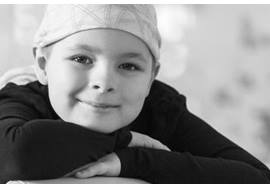Comprehensive Sarcoma Program
Sarcomas are an uncommon and complex type of childhood cancer. About 15% of pediatric malignancies each year in the United States are sarcomas. Treatment of these difficult tumors requires coordination and integration of many different specialist and experts to achieve best outcomes.
The Nationwide Children's Hospital’s Comprehensive Sarcoma Program brings together a team with expertise in the diagnosis and management of bone and soft tissue sarcoma, with an emphasis on novel and innovative treatment approaches. From clinical trials, targeted chemotherapy and immunotherapy to expert orthopedic and surgical oncologists, our experts are among the best in the world. Our surgeons are nationally recognized experts in tumor resection, utilizing the most cutting-edge surgical techniques, including the latest in limb preservation. Finally, our experts in radiation oncology, physical/occupational therapy, and psychosocial support services allow us to provide a truly multidisciplinary team and comprehensive patient experience. By doing so, we individualize care for sarcoma patients to maximize long-term survival and preserve functional outcomes.
Nationwide Children’s is also a leader in sarcoma research, with investigators studying both the biology of these rare cancers and novel approaches to their management.


About Our Program
Sarcoma describes a group of cancers that arise from connective or nonepithelial tissues such as bone or muscle and can occur anywhere in the body. These are rare cancers in children, making up less than 15% of pediatric malignancies. Because of the infrequency of these cancers and the aggressive clinical course they can often have, it is important that patients be treated in centers with expertise in their diagnosis and management.
The Nationwide Children's Comprehensive Sarcoma Program is a multi-disciplinary group of professionals who work together closely to combat these rare, but deadly cancers. Our oncology team works hand in hand with surgical specialists to provide state of the art care for patients with bone and soft tissue sarcoma, including:
- Systematic chemotherapy and clinical trials for patients with newly diagnosed and relapsed sarcoma.
- Cutting edge molecular diagnostic and sequencing techniques.
- The latest surgical advancements for bone and soft tissue sarcoma patients, including limb salvage.
- Unique comprehensive clinics in orthopedic and surgical oncology.
- Advanced imaging techniques for staging and response assessment.
- Comprehensive psycho-social support to assist patients with adjustment to the diagnosis and provide support during treatment.
- Oncofertility services for patients receiving chemotherapy.
- Symptom management support from Nationwide Children’s Hospital’s Pain and Advanced Illness Management Teams.
- A multi-disciplinary survivorship program.
- A unique fourth year sarcoma fellowship for pediatric oncologists.
For Medical Professionals – Why Choose Us?
The Comprehensive Sarcoma Program is a Germain Family Accelerator Program, a designation that provides additional funding to speed the integration of clinical care and research to make the largest impact on child health outcomes. By streamlining research, clinical care, and interdisciplinary experts, the comprehensive sarcoma team is dedicated to maximizing long-term survival and preserving functional outcomes.
Meet Our Team
Our team combines experts from fields across the hospital to ensure a thorough plan from diagnosis to treatment to survival and beyond.

Surgical Treatment Options
The types of treatment used most often to treat childhood cancer are surgery, chemotherapy, radiation therapy, and bone marrow transplantation.
Surgery is a local therapy that involves the surgical removal of all or part of the cancer. Often, surgery is used with chemotherapy and/or radiation therapy. The type of operation will depend on the location of the main tumor, its size and other individual factors.
Orthopedic Oncology Program
Children and adults with benign or malignant tumors of the bone or soft tissue may benefit from the specialized expertise provided by the Orthopedic Oncology Program at Nationwide Children’s. With a staff devoted exclusively to the removal of these growths — including a special focus on Ewing sarcoma and osteosarcoma — our offerings lead the nation in expertise, volume and variety. The Orthopedic Oncology Program focuses on innovative limb salvage strategies and ways to protect quality of life both now and in the future for our patients. We are supported by a robust range of related programs at Nationwide Children’s to help maximize health outcomes, from oncology and child life to adaptive therapies and rehabilitation resources.
Medical Treatment Options
The types of treatment used most often to treat childhood cancer are surgery, chemotherapy, radiation therapy, and bone marrow transplantation. More recently, new approaches to treatment, such as tumor sequencing and immunotherapy, have been utilized to offer more options for patients. The goal of treatment is to destroy the cancer cells. Your child’s therapy may have include one kind of therapy or a combination of treatments and they may have to have a variety of tests and procedures during treatment. Their treatment plan depends on the type of cancer, stage of disease and many other factors. Before treatment starts, your doctor will discuss the treatment plan with you including expected benefits, risks and side effects. Nationwide Children's also participates in clinical trials.
The Blood and Cancer Center at Nationwide Children's Hospital is one of the largest pediatric cancer centers in the country and a member of the Children’s Oncology Group (COG), which ensures that your child will get the highest quality care available. Our program is uniquely family-centered, with patients benefiting from a multi-disciplinary clinical team and state-of-the-art facility.
- Chemotherapy is the treatment of cancer with “anti-cancer” drugs to destroy cancer cells throughout the body. Chemotherapy drugs slow or stop cancer cells from growing and making more abnormal cells. These drugs also may affect normal healthy cells, but healthy cells can repair and return to normal.
- Radiation Therapy is the treatment of cancer and other diseases with high-energy rays to damage or destroy cancer cells in the area being treated making it impossible for the cancers cells to continue to grow and multiply. Most radiotherapy is delivered from the outside of the body (external beam radiotherapy) usually in the form of high energy X-rays. Radiation therapy can damage normal cells as well as cancer cells. When this happens, side effects occur. If your child is receiving radiation therapy, you will receive more information from your doctors and nurses.
- Cellular Therapy harnesses the natural ability of the immune system to fight cancer utilizing therapies that are less toxic than current therapies. Treatments include engineered natural killer cells, CAR-T, virotherapy and small molecules such as monoclonal antibodies.
- A Bone Marrow Transplant (BMT) replaces diseased bone marrow with healthy bone marrow. Bone marrow is the soft material inside the bones of the body that makes blood cells. In an autologous bone marrow transplant, the patient’s own bone marrow is treated and reinfused (put back into the patient). In an allogenic bone marrow transplant, healthy marrow comes from a donor.
Learn more about surgical treatment options.
Clinical Trials
You or your child may be asked to participate in a clinical trial. Your participation in this research study is voluntary.
A clinical trial is a research study in which physicians find ways to improve cancer treatment. The goals of these studies are to answer scientific questions about preventing, diagnosing and treating cancer.
A clinical trial for cancer treatment occurs in three phases.
- Phase I – This is a first study done on a drug to test its safety profile, to determine the right dose, and to determine when and how to give the drug. These studies usually are limited to a small number of patients.
- Phase II – As in Phase I, this phase also tests the safety of a drug, but the trial also tests how well the drug works to treat different types of cancers.
- Phase III – This phase of a clinical trial studies various drugs, usually in combination, against standard therapy. These studies enroll large numbers of patients at many different cancer centers.
Cancer treatment has improved greatly over the past several decades due to the use of clinical trials. Children’s Hospital does Phase I, Phase II and Phase III clinical trials. If you are asked to participate in a clinical trial, the physician will review the study and consent form with you and answer your questions. You will receive a pamphlet with more detailed information about clinical trials to help you make a decision.
Tests and Procedures
Depending on your child’s diagnosis, he or she may need to have tests or procedures done periodically through their treatment. These may be done to see how your child is responding to treatment or to keep a watch on side effects.
Click on the links below to learn more about specific tests and procedures:
- PET Scan: Nuclear Medicine
- Bone Scan: Nuclear Medicine
- CT Scan
- MRI (Magnet Resonance Imaging)
- Ultrasound Scan
- EKG (Electrocardiogram)
- Echocardiogram
- IV Therapy
- Bone Marrow Aspiration Test
- Spinal Tap
Treatment Outcomes
Nationwide Children's Hospital has the largest and most advanced pediatric cancer program in Ohio – and one of the largest in the nation. In addition, Nationwide Children’s Hospital is consistently one of the top hospitals for pediatric cancer outcomes according to US News and World Report. While five year overall survival rates for children diagnosed with cancer are now over 80% much work remains to be done to find effective treatments cures for those where worse outcomes. Nationwide Children's Research Institute ranks in the top 10 of free-standing pediatric research centers based on National Institutes of Health funding.
Sarcoma Fellowship Program:
The fourth year fellowship in sarcoma is designed to allow individuals who have completed a hematology/oncology fellowship program an additional year to develop expertise in the biology and management of these often challenging cases. The oncology faculty at Nationwide Children's Hospital has a unique mix of clinical and basic research expertise, and an emphasis is placed on understanding the biologic factors that drive tumor development, impact outcomes, and influence new agent development for sarcoma patients. The fellow also spends time with experts at The Ohio State University Wexner Medical Center to broaden their exposure to different ideas in sarcoma management, and participates in teaching medical students and residents. Lastly, while the curriculum is balanced between clinical and research time, the program is designed to allow flexibility to meet the needs of the individual trainee.
Conditions We Treat
- Alveolar Soft Part Sarcoma
- Angiomatoid Fibrous Histiocytoma
- Angiosarcoma
- Chondrosarcoma
- Chordoma
- Clear Cell Sarcoma
- Dermatofibrosarcoma Protuberans (DFSP)
- Desmoid Tumor (Fibromatosis)
- Desmoplastic Small Round Cell Tumor
- Epithelioid Sarcoma
- Ewing Sarcoma
- Fibromyxoid Sarcoma
- Giant Cell Fibroblastoma
- Giant Cell Tumor
- Infantile Fibrosarcoma
- Infantile Myofibromatosis
- Inflammatory Myofibroblastic Tumor
- Leiomyosarcoma
- Malignant Peripheral Nerve Sheath Tumor
- Myxoid Liposarcoma
- Ossifying Fibromyxoid Tumor (OFMT)
- Osteoblastoma
- Osteosarcoma
- Other Rare Bone Tumors
- Other Rare Soft Tissue Tumors
- Plexiform Fibrohistiocytic Tumor
- Rhabdomyosarcoma
- Round Cell Sarcomas (CIC and BCOR fusion sarcomas)
- Synovial Sarcoma
- Undifferentiated Pleomorphic Sarcoma (UPS)


